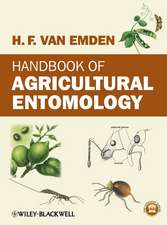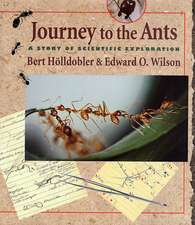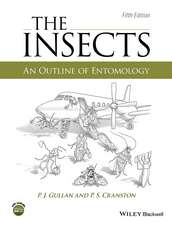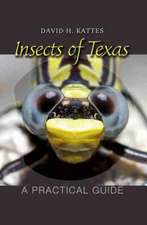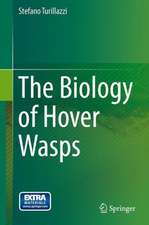Insect Hearing: Springer Handbook of Auditory Research, cartea 55
Editat de Gerald S. Pollack, Andrew C. Mason, Arthur N Popper, Richard R. Fayen Limba Engleză Hardback – 14 iun 2016
| Toate formatele și edițiile | Preț | Express |
|---|---|---|
| Paperback (1) | 639.59 lei 6-8 săpt. | |
| Springer International Publishing – 30 mai 2018 | 639.59 lei 6-8 săpt. | |
| Hardback (1) | 645.79 lei 6-8 săpt. | |
| Springer International Publishing – 14 iun 2016 | 645.79 lei 6-8 săpt. |
Din seria Springer Handbook of Auditory Research
- 5%
 Preț: 680.40 lei
Preț: 680.40 lei - 24%
 Preț: 948.24 lei
Preț: 948.24 lei - 15%
 Preț: 650.55 lei
Preț: 650.55 lei - 18%
 Preț: 952.26 lei
Preț: 952.26 lei - 18%
 Preț: 956.50 lei
Preț: 956.50 lei - 18%
 Preț: 954.31 lei
Preț: 954.31 lei - 18%
 Preț: 949.42 lei
Preț: 949.42 lei - 18%
 Preț: 951.29 lei
Preț: 951.29 lei - 18%
 Preț: 956.03 lei
Preț: 956.03 lei - 18%
 Preț: 956.03 lei
Preț: 956.03 lei - 15%
 Preț: 637.93 lei
Preț: 637.93 lei - 18%
 Preț: 960.13 lei
Preț: 960.13 lei - 18%
 Preț: 952.68 lei
Preț: 952.68 lei - 18%
 Preț: 951.59 lei
Preț: 951.59 lei - 18%
 Preț: 1393.27 lei
Preț: 1393.27 lei - 18%
 Preț: 955.25 lei
Preț: 955.25 lei - 18%
 Preț: 957.44 lei
Preț: 957.44 lei - 18%
 Preț: 950.52 lei
Preț: 950.52 lei - 18%
 Preț: 949.73 lei
Preț: 949.73 lei - 18%
 Preț: 953.03 lei
Preț: 953.03 lei - 18%
 Preț: 947.35 lei
Preț: 947.35 lei - 18%
 Preț: 957.62 lei
Preț: 957.62 lei - 18%
 Preț: 954.62 lei
Preț: 954.62 lei - 18%
 Preț: 950.84 lei
Preț: 950.84 lei - 15%
 Preț: 644.63 lei
Preț: 644.63 lei - 24%
 Preț: 807.83 lei
Preț: 807.83 lei - 18%
 Preț: 951.47 lei
Preț: 951.47 lei
Preț: 645.79 lei
Preț vechi: 759.76 lei
-15% Nou
Puncte Express: 969
Preț estimativ în valută:
123.57€ • 129.03$ • 102.04£
123.57€ • 129.03$ • 102.04£
Carte tipărită la comandă
Livrare economică 15-29 aprilie
Preluare comenzi: 021 569.72.76
Specificații
ISBN-13: 9783319288888
ISBN-10: 3319288881
Pagini: 241
Ilustrații: XIII, 262 p. 53 illus., 21 illus. in color.
Dimensiuni: 155 x 235 x 18 mm
Greutate: 0.57 kg
Ediția:1st ed. 2016
Editura: Springer International Publishing
Colecția Springer
Seria Springer Handbook of Auditory Research
Locul publicării:Cham, Switzerland
ISBN-10: 3319288881
Pagini: 241
Ilustrații: XIII, 262 p. 53 illus., 21 illus. in color.
Dimensiuni: 155 x 235 x 18 mm
Greutate: 0.57 kg
Ediția:1st ed. 2016
Editura: Springer International Publishing
Colecția Springer
Seria Springer Handbook of Auditory Research
Locul publicării:Cham, Switzerland
Public țintă
ResearchCuprins
Preface.- Introduction to Insect Acoustics.- Evolution of Acoustic Communication in Insects.- Behavioral Ecology of Insect Acoustic Communication.- Hearing for Defense.- Vibrational Signaling.- Mechanical Specializations of Insect Ears.- Auditory Transduction.- Central Neural Processing of Sound Signals in Insects.- Information Processing in the Auditory Pathway of Insects.- Hearing in Drosophila.- Index.
Notă biografică
Gerald Pollack is a Professor in the Department of Biology, McGill University, which he joined in 1979. He is internationally recognized for his work on the auditory neuroethology of insects, a topic about which he has authored several important invited reviews and book chapters. His own research concerns the auditory behavior and neurophysiology of crickets, where he has examined problems such as the neural mechanisms underlying sound localization, predator detection, and encoding of species-specific communication signals. His body of work has garnered >1500 citations. Andrew Mason’s research is in acoustic communication and sensory biology of insects and spiders. His work on sound localization and auditory processing in the tachinid fly Ormia ochracea has documented hyper-acute directional acuity and source-segregation based on a precedence effect in the periphery of this micro-scale auditory system. Other work, on sound generation and signal function in orthopteran insects and substrate-borne vibration signals in in spiders, has addressed the evolution of communication and the role of signal complexity.
Textul de pe ultima copertă
Insect Hearing provides a broadly based viewof the functions, mechanisms, and evolution of hearing in insects. With asingle exception, the chapters focus on problems of hearing and theirsolutions, rather than being focused on particular taxa. The exception, hearing in Drosophila, serves as a case study of one of the most important model systems in neurobiology, including the neurobiology of hearing. Auditory systems, whether insect or vertebrate, must perform a number of basictasks: capturing mechanical stimuli and transducing these into neural activity,representing the timing and frequency of sound signals, distinguishing betweenbehaviorally relevant signals and other sounds and localizing sound sources.Studying how these are accomplished in insects offers a valuable comparativeview that helps to reveal general principles of auditory function.
· Introduction to Insect Acoustics by Andrew C. Mason and Gerald S. Pollack
· Evolution of Acoustic Communication in Insects by Michael D. Greenfield
· Behavioral Ecology of Insect Acoustic Communication by Rohini Balakrishnan
· Hearing for Defense by Gerald S. Pollack
· Vibrational Signaling by Jayne Yack
· Mechanical Specializations of Insect Ears by James F. C. Windmill andJoseph C. Jackson
· Auditory Transduction by Daniel F. Eberl, Azusa Kamikouchi, and Joerg T. Albert
· Central Neural Processing of Sound Signals in Insects by Berthold Hedwig and Andreas Stumpner
· Information Processing in the Auditory Pathway of Insectsby Bernhard Ronacher
· Hearing in Drosophilaby Azusa Kamikouchi and Yuki Ishikawa
About the Editors:
Gerald Pollack is a Professor Emeritus in the Departmentof Biology at McGill University.
Andrew Mason is Associate Professor & Chair in theDepartment of Biological Sciences at the University of Toronto, Scarborough.
Richard R. Fay is Distinguished Research Professor ofPsychology at Loyola University Chicago.
Arthur N. Popper is Professor Emeritus and Research Professorin the Department of Biology at the University of Maryland, College Park.
About the Series:
The Springer Handbook of AuditoryResearch presents a series of synthetic reviews of fundamental topics dealingwith auditory systems. Each volume is independent and authoritative; taken as aset, this series is the definitive resource in the field.
· Introduction to Insect Acoustics by Andrew C. Mason and Gerald S. Pollack
· Evolution of Acoustic Communication in Insects by Michael D. Greenfield
· Behavioral Ecology of Insect Acoustic Communication by Rohini Balakrishnan
· Hearing for Defense by Gerald S. Pollack
· Vibrational Signaling by Jayne Yack
· Mechanical Specializations of Insect Ears by James F. C. Windmill andJoseph C. Jackson
· Auditory Transduction by Daniel F. Eberl, Azusa Kamikouchi, and Joerg T. Albert
· Central Neural Processing of Sound Signals in Insects by Berthold Hedwig and Andreas Stumpner
· Information Processing in the Auditory Pathway of Insectsby Bernhard Ronacher
· Hearing in Drosophilaby Azusa Kamikouchi and Yuki Ishikawa
About the Editors:
Gerald Pollack is a Professor Emeritus in the Departmentof Biology at McGill University.
Andrew Mason is Associate Professor & Chair in theDepartment of Biological Sciences at the University of Toronto, Scarborough.
Richard R. Fay is Distinguished Research Professor ofPsychology at Loyola University Chicago.
Arthur N. Popper is Professor Emeritus and Research Professorin the Department of Biology at the University of Maryland, College Park.
About the Series:
The Springer Handbook of AuditoryResearch presents a series of synthetic reviews of fundamental topics dealingwith auditory systems. Each volume is independent and authoritative; taken as aset, this series is the definitive resource in the field.
Caracteristici
Provides a broadly based view of the functions, mechanisms, and evolution of hearing in insects Focused on problems of hearing and their solutions, rather than being focused on particular taxa Provides an overview of the current state of knowledge of insect hearing and points the way towards future studies Includes supplementary material: sn.pub/extras

